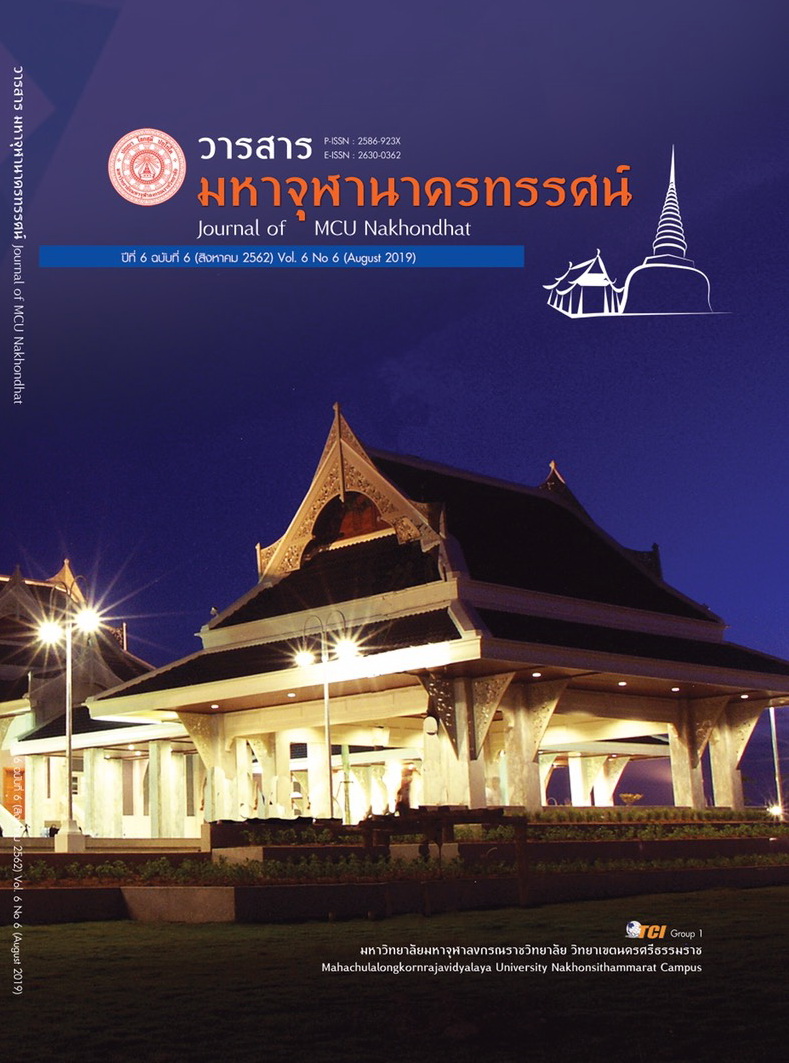A MODEL OF POTENTIAL DEVELOPMENT BASED ON BUDDHADHAMMA FOR GRADUATE STUDENTS IN EDUCATIONAL ADMINISTRATION PROGRAM IN AUTONOMOUS UNIVERSITIES
Main Article Content
Abstract
This research the objectives are 1) to study the potential of graduates. Department of Management Studies University Autonomy 2) to study the development of graduates. Department of Management Studies According to Buddhism University Autonomy and 3) to propose ways to improve graduate. Department of Management Studies According to Buddhism University Autonomy Methodology used a blended approach (Mixed Methods Research) during the qualitative research interview. This information is qualified 5 / person and focus groups (Focus Group) from qualified 9 / person for a group discussion. Data were analyzed using content analysis and quantitative research using questionnaires. (Questionnaires) from a sample of 317 Photos / The statistics used were percentage, mean ( ) and the standard deviation (SD)
results showed that:
- The opinion of graduates in the overall level. all three aspects: knowledge, skills and attitudes.
- horizontal development potential graduates. Department of Management Studies According to Buddhism University Autonomy is STEP3 MODEL, which is the introduction of Western medicine integrated with Buddhism in order to benefit the development of graduates in graduate.
- Form the Development Academy. Department of Management Studies According to Buddhism University Autonomy are composed of 4 components: 1) Objective 2) Content 3) development process, and 4) assessment.
Article Details
References
บุญชม ศรีสะอาด. (2535). การวิจัยเบื้องต้น (พิมพ์ครั้งที่ 5). กรุงเทพมหานคร: สุวีริยาสาส์นการพิมพ์.
พลตรี ณรัฐ สวาสดิ์รัตน์. (2558). รูปแบบการพัฒนาศักยภาพการปฏิบัติงานของอาสาสมัครทหารพรานในจังหวัดชายแดนภาคใต้ตามหลักพุทธธรรม. วารสาร มจร สังคมศาสตร์ปริทรรศน์, 4(2), 179-196.
เพชรธนินทร์ การะวิโก. (2558). รูปแบบการประยุกต์หลักพุทธธรรมในการบริหารสถานศึกษาสังกัดสำนักงานเขตพื้นที่การศึกษามัธยมศึกษา เขต 4. ใน ดุษฎีนิพนธ์พุทธศาสตรดุษฎีบัณฑิต สาขาวิชาพุทธบริหารการศึกษา. มหาวิทยาลัยมหาจุฬาลงกรณราชวิทยาลัย.
ว่าที่ร้อยตรีหญิง สุทธญาณ์ โอบอ้อม. (2558). การพัฒนาศักยภาพบุคลากรขององค์กรปกครองส่วนท้องถิ่นตามแนวพระพุทธศาสนา. ใน ดุษฎีนิพนธ์พุทธศาสตรดุษฎี สาขาการบริหารจัดการคณะสงฆ์. มหาวิทยาลัยมหาจุฬาลงกรณราชวิทยาลัย.
สำนักงานคณะกรรมการอุดมศึกษา. (2561). สถิติข้อมูลจำนวนบัณฑิตสาขาบริหารการศึกษา มหาวิทยาลัยในกำกับของรัฐ. เรียกใช้เมื่อ 24 ธันวาคม 2561 จาก https://www. mua.go.th/assets/img/pdf/61.10.26_สถิติอุดมศึกษา%202558-2560_V4.pdf
สุภางค์ จันทวานิช. (2540). วิธีวิจัยเชิงคุณภาพ. กรุงเทพมหานคร: โรงพิมพ์แห่งจุฬาลงกรณ์ราชวิทยาลัย.
สุมน อมรวิวัฒน์. (2544). หลักบูรณาการทางการศึกษาตามนัยแห่งพุทธธรรม. กรุงเทพมหานคร : มหาวิทยาลัยสุโขทัยธรรมาธิราช.
อุดร เขียวอ่อน. (2560). รูปแบบการพัฒนาศักยภาพของพระธรรมทูตสายต่างประเทศ. ใน ดุษฎีนิพนธ์พุทธศาสตรดุษฎีบัณฑิต สาขาพุทธบริหารการศึกษา. มหาวิทยาลัยมหาจุฬาลงกรณราชวิทยาลัย.
Prensky. M. (2001). a. Digital Natives Digital Immigrants Part 1. On the Horizon, 9(5), 1-6.


